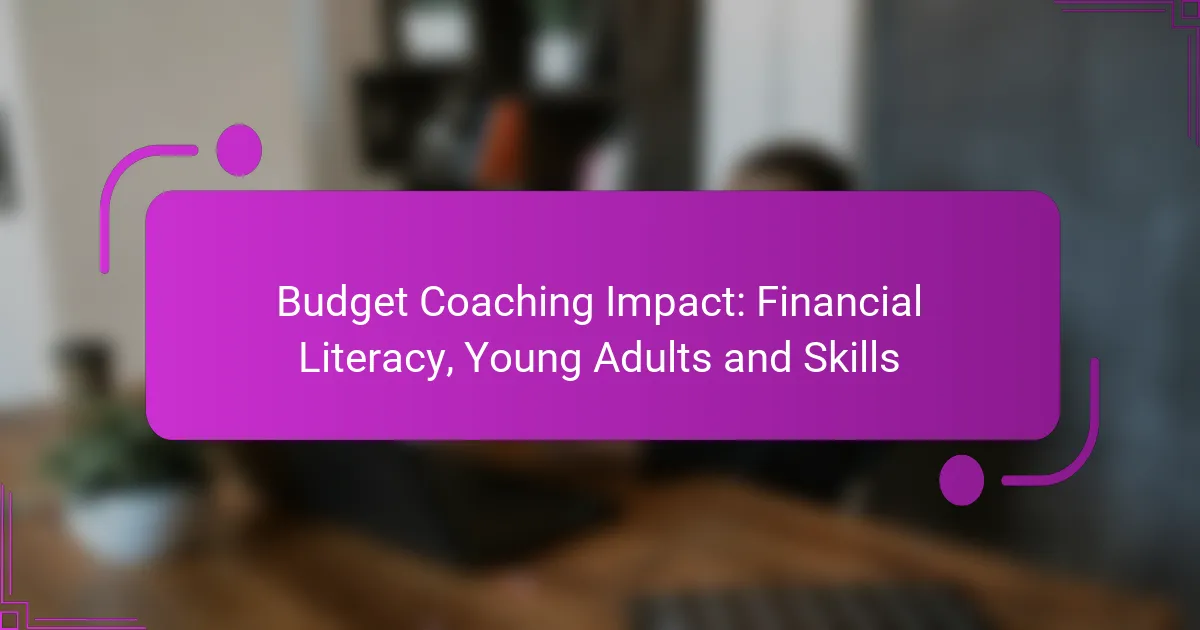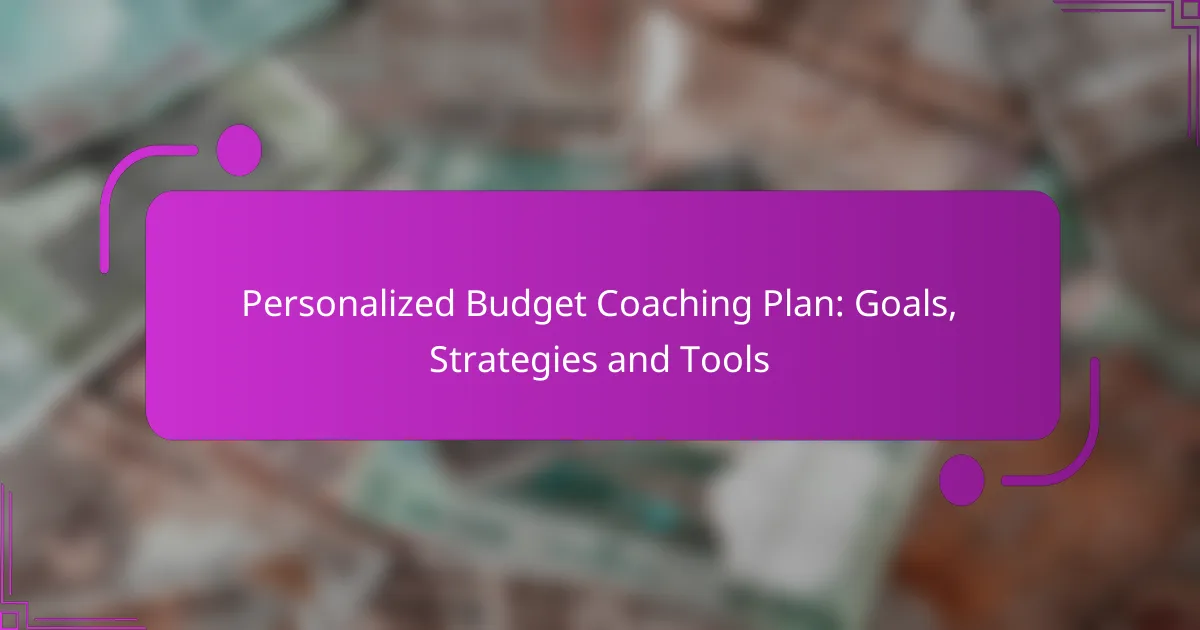Budget coaching plays a crucial role in improving financial literacy among young adults by equipping them with the necessary skills to manage their finances effectively. Through tailored guidance, participants learn to create budgets, track expenses, and make informed financial choices, ultimately empowering them to achieve their financial goals.
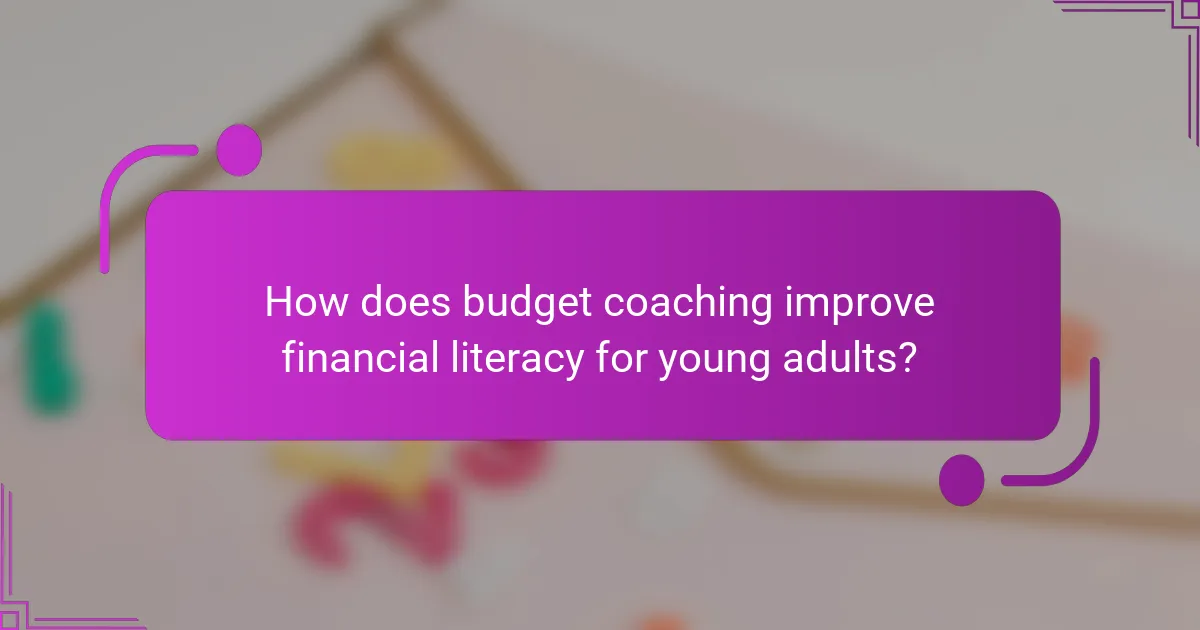
How does budget coaching improve financial literacy for young adults?
Budget coaching significantly enhances financial literacy among young adults by providing them with essential skills and knowledge to manage their finances effectively. Through personalized guidance, individuals learn to create budgets, understand their spending habits, and make informed financial decisions.
Increased understanding of budgeting principles
Budget coaching helps young adults grasp fundamental budgeting principles, such as tracking income and expenses. By learning to categorize spending, they can identify areas where they can cut costs and allocate funds more efficiently.
Coaches often introduce tools like spreadsheets or budgeting apps, which simplify the process of monitoring finances. This hands-on approach fosters a deeper comprehension of how to maintain a balanced budget and the importance of financial planning.
Enhanced decision-making skills
With improved financial literacy, young adults develop better decision-making skills regarding their finances. They learn to evaluate the long-term impacts of their financial choices, such as the benefits of saving versus the costs of impulsive purchases.
Coaching sessions often include scenario-based discussions, allowing individuals to practice making informed choices in a supportive environment. This practice builds confidence and prepares them for real-life financial situations.
Improved savings habits
Budget coaching encourages young adults to cultivate better savings habits by setting realistic financial goals. Coaches help individuals establish short-term and long-term savings targets, making it easier to prioritize saving over unnecessary spending.
By implementing strategies like the 50/30/20 rule, where 50% of income goes to needs, 30% to wants, and 20% to savings, young adults can systematically increase their savings. Regular check-ins with a coach can reinforce these habits and keep individuals accountable.
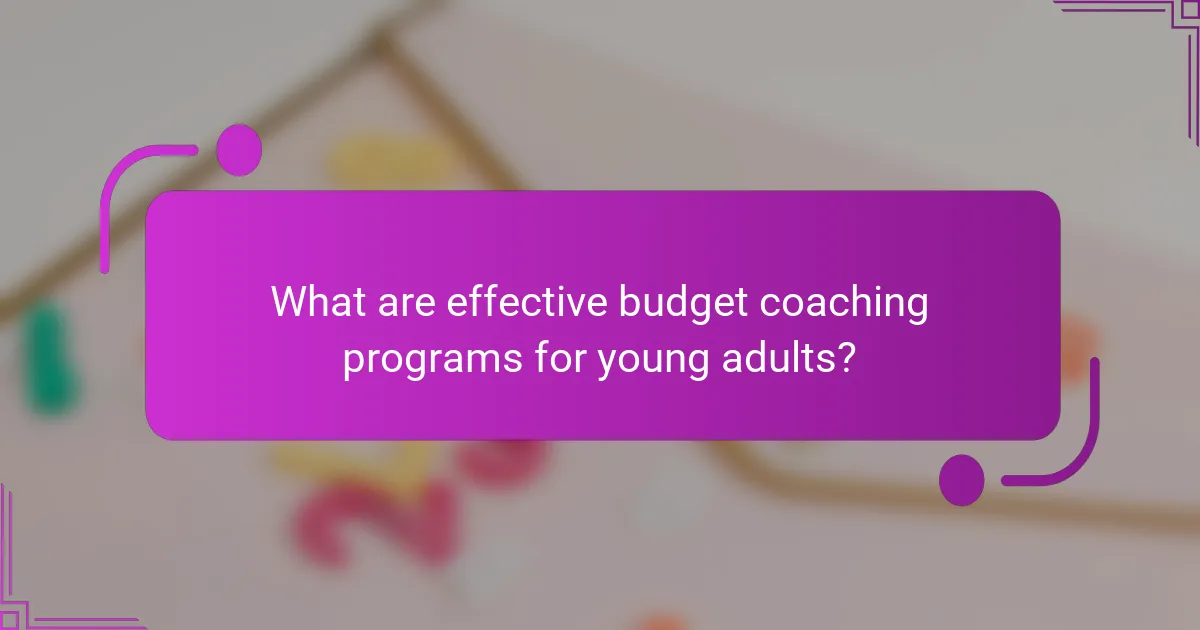
What are effective budget coaching programs for young adults?
Effective budget coaching programs for young adults focus on enhancing financial literacy and practical money management skills. These programs typically provide structured guidance, tools, and resources to help participants create and stick to budgets, understand credit, and make informed financial decisions.
Financial Peace University
Financial Peace University (FPU) is a comprehensive program created by Dave Ramsey that teaches budgeting and debt management through a series of video lessons and group discussions. Participants learn to create a zero-based budget, which allocates every dollar of income to specific expenses, savings, or debt repayment.
FPU emphasizes the importance of an emergency fund and offers practical steps for paying off debt using the snowball method. This method encourages individuals to focus on paying off smaller debts first to build momentum and confidence.
Smart About Money
Smart About Money is an online resource that provides free courses and tools designed to improve financial literacy among young adults. The platform covers essential topics such as budgeting, saving, and investing, allowing users to learn at their own pace.
This program includes interactive budgeting tools that help users track their expenses and set financial goals. It also offers personalized action plans based on individual financial situations, making it easier for young adults to apply what they learn.
My Money Coach
My Money Coach is a financial coaching program that focuses on personalized budget planning and financial education. Coaches work one-on-one with participants to assess their financial situations and develop tailored budgets that align with their goals.
The program emphasizes accountability and ongoing support, helping young adults stay on track with their financial plans. Participants are encouraged to set realistic goals and regularly review their budgets to adapt to changing circumstances.
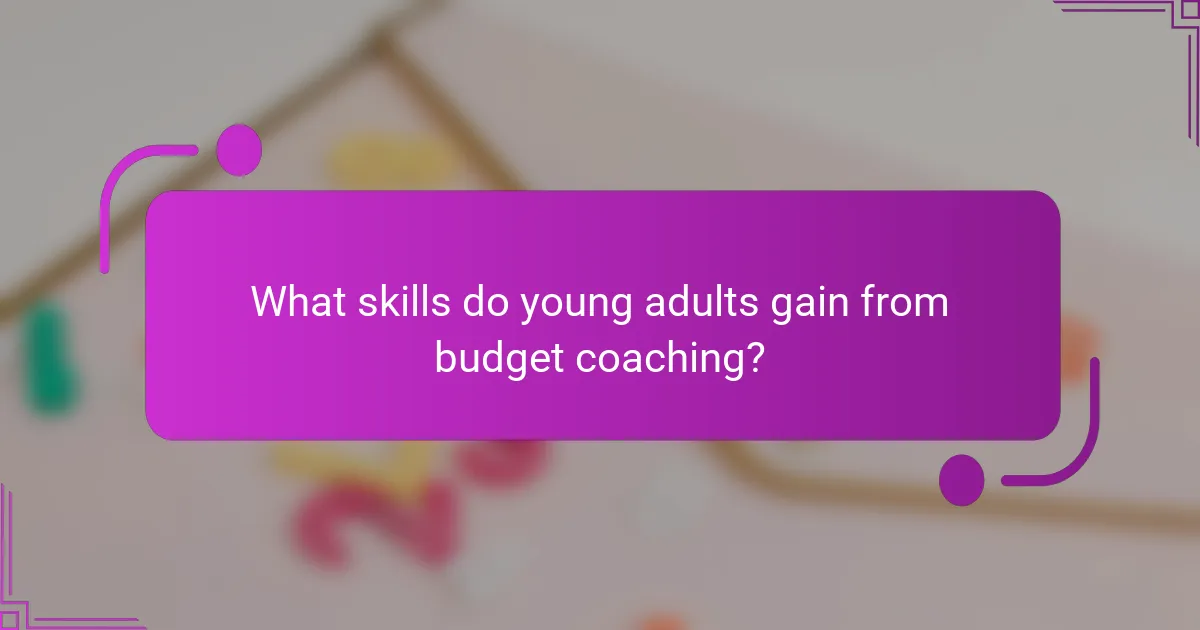
What skills do young adults gain from budget coaching?
Young adults gain essential financial skills from budget coaching that empower them to manage their money effectively. These skills include goal-setting, expense tracking, and debt management, which collectively enhance their financial literacy and decision-making abilities.
Goal-setting techniques
Budget coaching teaches young adults how to set realistic financial goals, such as saving for a car or paying off student loans. Techniques often involve the SMART criteria—Specific, Measurable, Achievable, Relevant, and Time-bound—to ensure goals are clear and attainable.
For example, instead of saying “I want to save money,” a young adult might set a goal to save $200 each month for six months. This clarity helps maintain motivation and focus on achieving financial objectives.
Expense tracking methods
Learning to track expenses is a crucial skill that budget coaching emphasizes. Young adults are taught to categorize their spending, which can reveal patterns and areas for improvement. Common methods include using mobile apps, spreadsheets, or even simple pen-and-paper logs.
For instance, a young adult might use an app to record daily expenses, allowing them to see where their money goes and adjust their budget accordingly. This practice can lead to more mindful spending and better financial choices.
Debt management strategies
Budget coaching provides strategies for managing and reducing debt, a common concern for young adults. Participants learn about prioritizing debts, understanding interest rates, and exploring repayment options like the snowball or avalanche methods.
For example, focusing on paying off high-interest debt first can save money in the long run. Coaches may also advise on negotiating with creditors or consolidating loans to simplify payments and reduce overall interest costs.
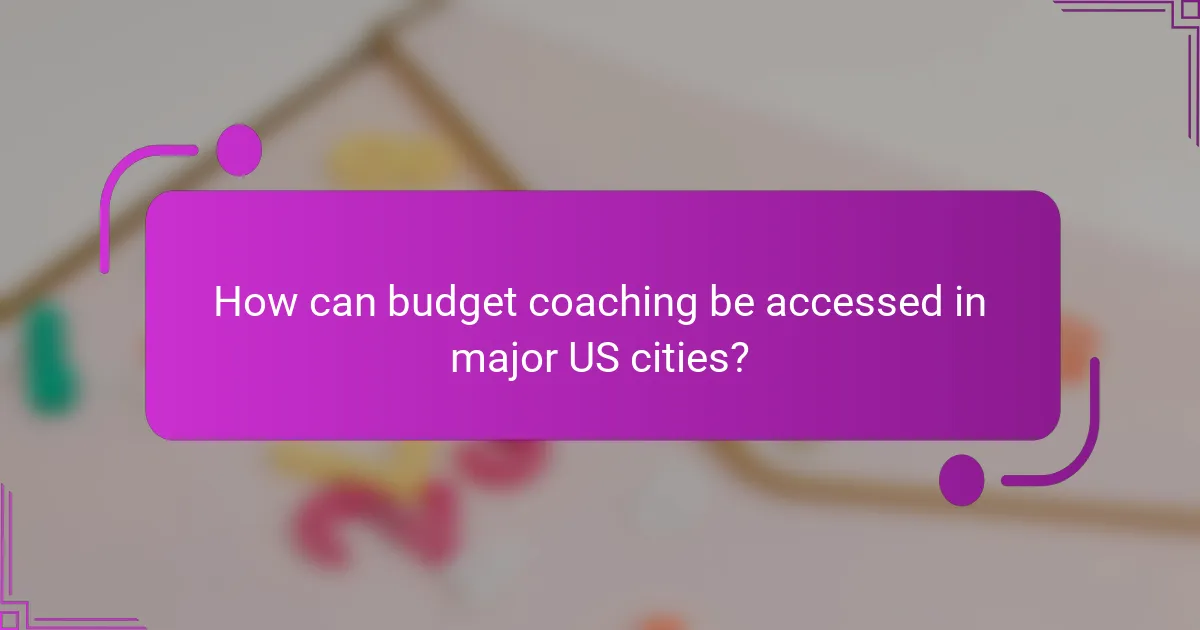
How can budget coaching be accessed in major US cities?
Budget coaching can be accessed through various channels in major US cities, including local workshops, online platforms, and community college courses. These resources aim to enhance financial literacy and equip young adults with essential budgeting skills.
Local workshops and seminars
Many cities offer local workshops and seminars that focus on budgeting and financial management. These events are often hosted by non-profit organizations, financial institutions, or community centers and may be free or low-cost.
Participants can expect interactive sessions that cover topics such as creating budgets, understanding credit, and managing debt. Check local listings or community boards for upcoming events in your area.
Online coaching platforms
Online coaching platforms provide flexible options for budget coaching, allowing users to learn at their own pace. Websites and apps like You Need a Budget (YNAB) or Mint offer tutorials, budgeting tools, and personalized coaching sessions.
These platforms often feature subscription models, with costs ranging from free to monthly fees. Look for platforms that offer trial periods to assess their suitability before committing.
Community college courses
Community colleges in major US cities frequently offer courses on personal finance and budgeting. These courses can be a cost-effective way to gain in-depth knowledge and skills.
Typically, classes cover essential topics such as financial planning, investment basics, and credit management. Enrollment fees vary, but many courses are priced affordably, making them accessible to young adults seeking to improve their financial literacy.
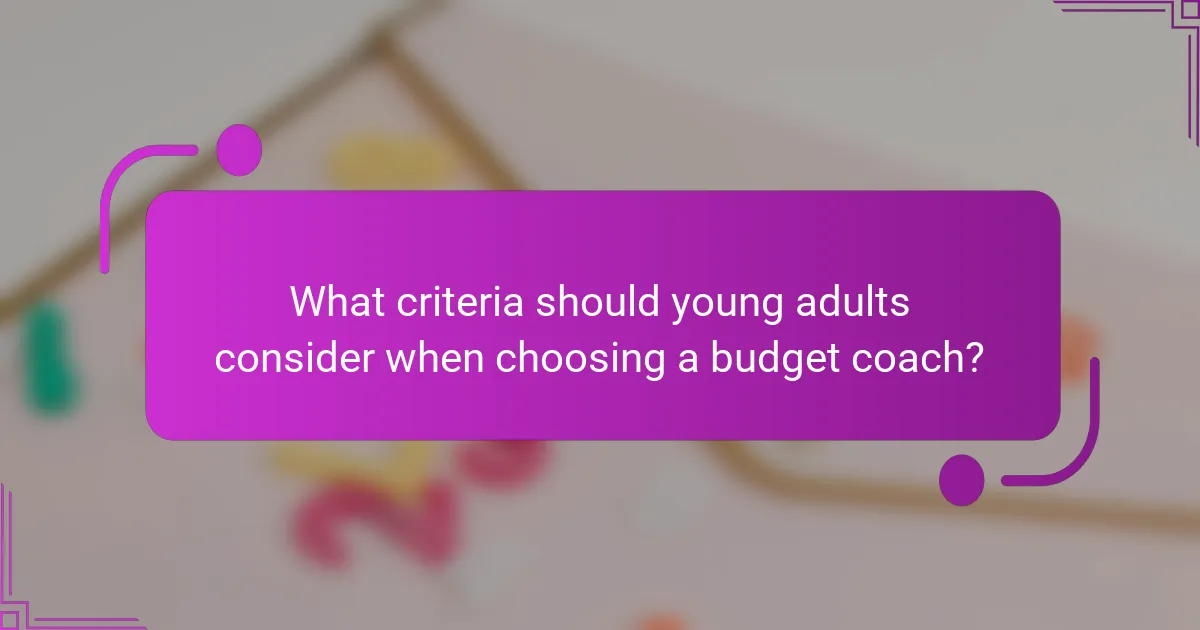
What criteria should young adults consider when choosing a budget coach?
Young adults should evaluate a budget coach based on their credentials, coaching style, and cost. These factors can significantly influence the effectiveness of the coaching experience and ensure that it aligns with personal financial goals.
Credentials and experience
When selecting a budget coach, verify their credentials and relevant experience. Look for certifications from recognized financial coaching organizations, as well as practical experience in personal finance management.
Consider how long the coach has been working in the field and whether they have successfully assisted clients with similar financial situations. A coach with a solid track record can provide valuable insights and strategies tailored to your needs.
Coaching style and approach
Different coaches have varying styles and approaches, so it’s essential to find one that resonates with you. Some may focus on a structured, step-by-step method, while others might adopt a more flexible, conversational style.
Assess whether the coach emphasizes accountability, goal-setting, or education. A good fit will enhance motivation and ensure that you stay engaged throughout the coaching process.
Cost and availability
Budget coaching fees can vary widely, typically ranging from $50 to $200 per session or more, depending on the coach’s experience and location. Determine your budget and find a coach whose fees align with your financial situation.
Additionally, consider the coach’s availability. Ensure they can accommodate your schedule and provide the support you need, whether through in-person meetings, phone calls, or online sessions.
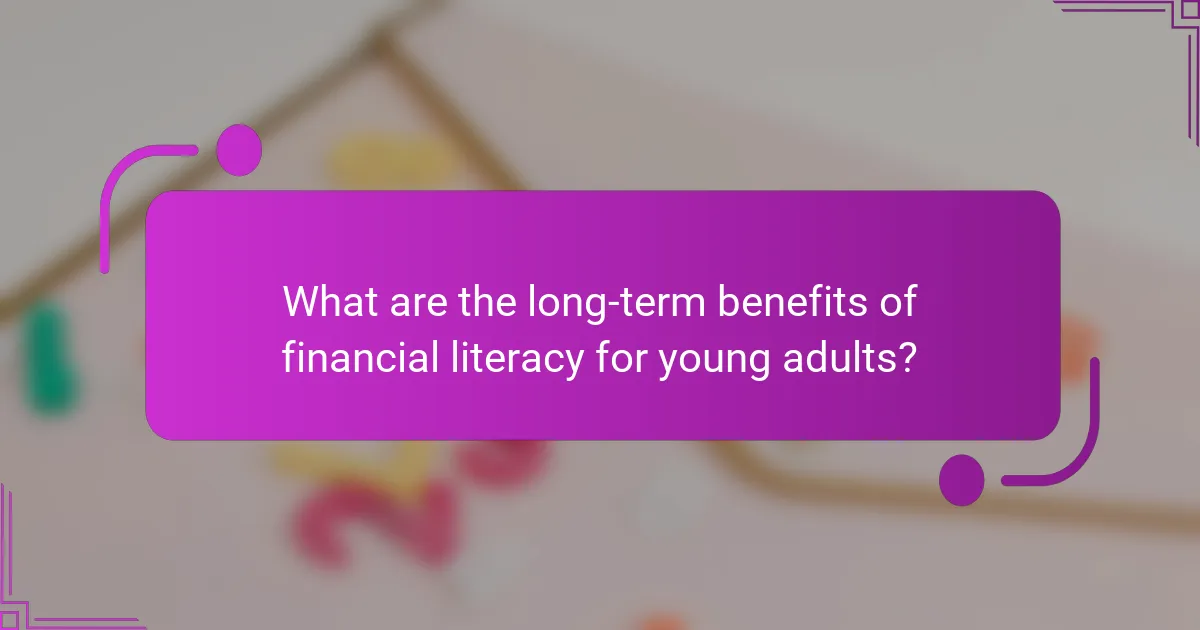
What are the long-term benefits of financial literacy for young adults?
Financial literacy equips young adults with the knowledge and skills to make informed financial decisions, leading to significant long-term benefits. These advantages include increased financial independence and better credit scores, both of which are crucial for achieving personal and financial goals.
Increased financial independence
Financial literacy fosters increased financial independence by enabling young adults to manage their money effectively. With a solid understanding of budgeting, saving, and investing, they can make choices that support their lifestyle without relying heavily on others.
For instance, young adults who grasp the basics of budgeting can allocate their income towards essential expenses, savings, and discretionary spending. This proactive approach helps them avoid debt and promotes a sense of control over their financial future.
Better credit scores
Understanding financial principles directly contributes to better credit scores, which are vital for securing loans and favorable interest rates. Young adults who are financially literate are more likely to make timely payments, maintain low credit utilization, and avoid unnecessary debt.
To improve their credit scores, young adults should regularly check their credit reports for errors, pay bills on time, and limit credit inquiries. Simple habits, like keeping credit card balances below 30% of their limits, can significantly enhance their creditworthiness over time.
